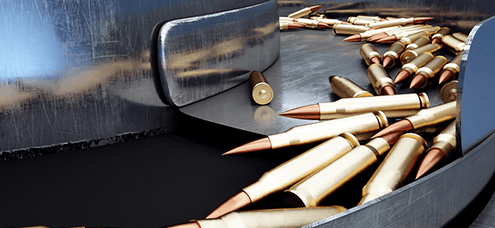The company focuses on providing affordable reloading components and ammunition with an emphasis on customer service. Over the years, the company has grown exponentially and become an exclusive company for many products.
It specializes in demil or “pull down” reloading components, along with factory seconds or blems. By offering these products, reloaders can save up to 50% off new retail prices.
Our client sought a solution to automate their bullet sorting process, as their current approach involves manual sorting, which is performed by a team of four individuals, handling two tonnes of bullets daily.
This manual process negatively affects both efficiency and quality. Implementing an automated system was crucial for enhancing efficiency and ensuring rigorous quality checks.
We addressed the client's requirement to automate the sorting of projectiles through a comprehensive approach, where our team conducted a thorough vision study and analysed the capabilities of our existing machinery to achieve the desired projectile sorting.
This study involved defining precise rejection criteria for identifying and eliminating defective projectiles from the sorting process.
By leveraging
advanced vision technology, we aimed to enhance the accuracy and efficiency of the sorting system, ensuring that only high-quality projectiles meet the specified criteria.
This meticulous approach reflects our commitment to providing a tailored solution that aligns with the client's needs for automation and quality improvement in projectile sorting.
Our inspection system consists of six tracks through which the bullets travel, undergoing a comprehensive examination through our advanced vision inspection cameras to detect and address any potential defects.
This multi-track setup allows for efficient and thorough scrutiny of each projectile, ensuring a meticulous inspection process for quality control.
In response to the client's need for automating their bullet sorting process, Jekson brought together multidisciplinary teams, including the Vision Team, Software Team, Mechanical Engineering, and Assembly Team.
This initiative marked a significant upgrade from Jekson's Tablet Inspection and
Sorter, used widely in the pharmaceutical industry, necessitating the reengineering of their existing product, the
Tablet Inspection Machine, for projectile inspection and sorting.

Solution:
Recognizing the unique characteristics of projectiles, the teams embarked on an extensive research and development journey.
The heavier weight of projectiles prompted upgrades in feeding trays, with changes from aluminum to polymer material. The background colour was switched to black polymer to enhance contrast.
The polymer material helped to reduce noise levels. Special machine finishing on the polymer ensured smooth movement of the bullets on the trays and offer a dull contrast for improved inspection.
The vibratory track received enhanced features to keep projectiles laid down, optimizing inspection.
In our current system, we employ an air blow rejection criterion, which has proven to be highly effective. In response to the unique rejection challenge posed by projectiles, the teams devised a solution using flaps resembling miniature fingers.
These flaps are operated by pneumatic air cylinders and are strategically positioned at the end of each inspection track, effectively pushed identified defective products toward the rejection system.
This innovative approach ensured a controlled and effective means of diverting faulty items, contributing to the precision and reliability of our sorting process.
The rejected projectiles were directed into a Hopper, allowing them to be cycled back for a secondary sorting process. The need for a double-sorting approach arises from the fact that our inspection focuses exclusively on the top of the bullet.
This two-stage sorting method ensures a more thorough examination and maintains the integrity of the sorting process for optimal quality control.
Results
The project, from inception to completion, spanned five months. The results were transformative, with the machine achieving a remarkable 21,000 projectiles per hour.
The client expressed satisfaction as the automated sorting system met their requirements, ensuring only quality products were accepted while defects were automatically rejected.
Jekson prioritized safety, cleanliness, and easy change part removal in the ammunition inspection process.
